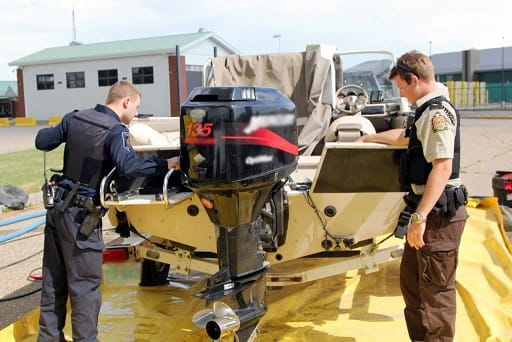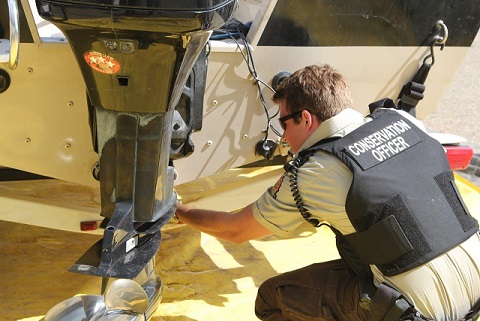Released on June 27, 2017
The Government of Saskatchewan has teamed up with Canada Border Services Agency (CBSA) to inspect watercraft entering the country for signs of aquatic invasive species.Since the start of 2017, CBSA has referred 81 high-risk watercraft to the Ministry of Environment for followup and checked more than 413 watercraft at the border.
“This joint effort with CBSA is part of the government’s aquatic invasive species prevention program,” Environment Minister Scott Moe said. “We are focusing on increased watercraft inspections, disinfecting high-risk watercraft entering the province, and additional education and awareness efforts to help protect our fish populations and aquatic habitats.”

Earlier this spring, Ministry of Environment staff provided supplementary training on aquatic invasive species to CBSA officers in southern Saskatchewan. Under the Customs Act and the Aquatic Invasive Species Regulations, CBSA officers have the authority to detain and refer to Fisheries and Oceans Canada officers or provincial enforcement authorities any aquatic species suspected to be live or dead zebra or quagga mussels and refuse infected watercraft entry into Canada, if necessary.
“Preventing the introduction of aquatic invasive species into Canadian waters is part of CBSA’s mandate, and we are proud to work together toward this end with the Ministry of Environment,” CBSA Chief of Operations Scott Kienlen said. “Our officers live and work in local communities and want to ensure our waterways remain safe for all to enjoy.”

Invasive mussels and other species can be impossible to eliminate if they become established in a waterbody, and have the potential to severely impact aquatic habitats, fisheries, valuable recreational resources and water-related infrastructure. Mussels can clog water intake structures and increase costs significantly for irrigation, power generation and municipal water supply.
Saskatchewan is also part of the West911 network of western provinces and U.S. states which notifies jurisdictions of the transportation of high-risk vessels. In 2012, this network helped to identify and successfully decontaminate a vessel infested with quagga mussels prior to its entry into Saskatchewan.
The province will continue conducting roadside watercraft inspections this year, focusing on the Manitoba and U.S. borders, and high-risk waterbodies and events, such as fishing and boating events and wakeboard competitions, which see an increased number of boats entering the province from other jurisdictions.
Before returning home from out of province, coming to visit or moving between waters within the province, please remember to CLEAN, DRAIN and DRY your watercraft and all related equipment to ensure it is free of invasive species.
More information about aquatic invasive species can be found in the Saskatchewan Anglers’ Guide, and online at www.saskatchewan.ca/residents/environment-public-health-and-safety/wildlife-issues/invasive-species/aquatic-invasive-species-prevention-program.

-30-
For more information, contact:
Jamie Gibson
Environment
Regina
Phone: 306-798-3900
Email: jamie.gibson@gov.sk.ca
Luke Reimer
Canada Border Services Agency
Winnipeg
Phone: 204-983-2537
